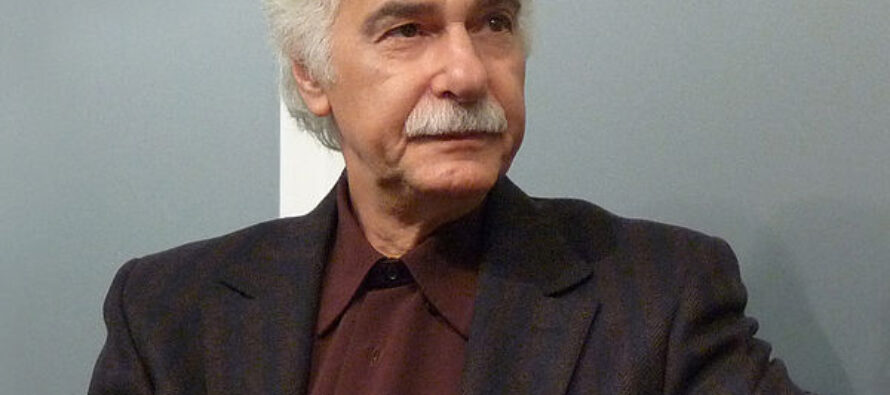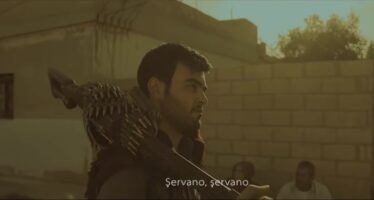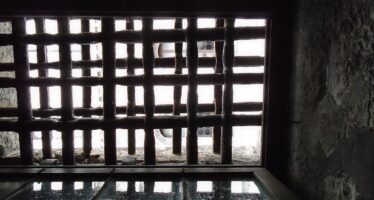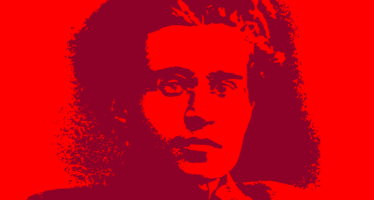Abdellatif Laabi an Introduction

![]()
Abdellatif Laâbi
“dear tear of Nagasaki
dear Caribbean guerilla
leave me now to write
the most dreadful
of love songs”
‘Vie urgente – Urgent Life’
“The Rule of Barbarism”
Abdellatif Laâbi, poet, writer, and translator was born in Fez, (a French Protectorate since 1912), in 1942.
Despite being little known up to now in the English speaking world his reputation in France has long been established, being awarded the Prix Goncourt in 2009 and the Grand Prix de la Francophonie of the French Academy in 2011.
In an interview in 2013 he talks about his family background:
“In The Bottom of the Jar, I recount several years of my childhood, from the age of 7 or 8 until the struggle for Moroccan independence in 1952 and 1953… My father and my mother didn’t know how to read or write. But that didn’t mean that they didn’t have a culture or that the popular language that they spoke was a language reduced to the level of its expressive capabilities…The ten of us lived in a small house of two rooms. My father was a simple craftsman who worked his entire life. My mother worked for us her entire life. It seemed they were almost slaves in our service, so that we could eat, so that we could be clothed, and so that we could go to school. All of that touches me very deeply—to see a man and a woman at that moment in time, in their condition, illiterate—who spent their entire life for us. And that’s why they appear not just in The Bottom of the Jar, but also in other books of mine.”
In 1956 Morocco, now a constitutional monarchy with an population of almost 34 million, achieved independence from France, with Hassan 11 becoming King in 1961. Hassan, notorious for his abuse of human rights during his time in power (“the Years of Lead“) suspended Parliament in 1965, declaring a State of Emergency. In the same year protesting workers and students were shot down on the streets by the military on the orders of the King.
“During the Years of Lead, dissidents were arrested, executed or “disappeared”, newspapers were closed and books were banned. There are few reliable lists of victims for the time, but there were hundreds of political killings and forced disappearances. Arbitrary arrests and torture affected many, including some of those outside the usual opposition networks.”
Max Nelson writes in the Paris Review (October 2015): “By the end of 1965, he (Laâbi) had evolved into a prominent member of the opposition to Mohammed V’s successor, Hassan II, whose regime had brutally suppressed a student uprising earlier that year. ‘Allow me to tell you,’ the king famously told the nation two days after the riot, ‘that there is no greater danger to the State than a so-called intellectual. It would have been better if you were all illiterate.'”
Nelson in the same essay identifies this as one of the reasons Abdellatif Laâbi and others founded the magazine Souffles, which was established one year later, in 1966. Souffles would last 6 years, being banned in 1972 and resulted in his arrest, torture and imprisonment by the regime.
“I will speak of everything
before a hired hand
comes to stab me in the back
patience
I’m going to speak
of the dead that went before me
those I spend time with
and those to come
everything will be said
this is my pledge to you”
‘Gloire à ceux qui nous torturent’
“The Rule of Barbarism”
André Naffis-Sahely in his 2012 Afterword to Laâbi’s “The Rule of Barbarism” writes:
“Souffles (Breaths), the renowned magazine that Laâbi founded in 1966. The first publisher of works by young writers such as Mohammed Khaïr-Eddine, Mustafa Nissaboury, Tahar Ben Jelloun, and Abdelkebir Khatibi, who have since come to symbolize that period in time, Souffles left an indelible mark on North African literature. Influenced by Fanon, as well as by Césaire, Mario de Andrade, and René Depestre, Souffles sought to transcend the colonizer/colonized dialectic, as well as to challenge literary conventions and political dogmas.”
As Laâbi wrote in the first issue: “Poetry is the only means left to man to proclaim his dignity, to be more than just a number, so that his breath will remain forever imprinted and attested to by his cry.” (Souffles, Numéro 1, 1er trimestre, 1966.)
Max Nelson: “By the early seventies, the publication had evolved into an iconic voice on the international Left—a space where translations from the Arabic ran side by side with essays on the Black Panthers, reports on the Palestinian occupation and dossiers ‘on the plastic arts.’ ”
Ursula Lindsey: “As the years went on, Souffles become more overtly engaged in politics, as several of its leaders formed a new Marxist-Leninist movement. But it never abandoned its focus on culture. In fact, Kenza Sefrioui, who has written a book about the magazine and the “hopes of a cultural revolution” it sparked, notes that the artists around Souffles believed ‘there should be no separation of culture and politics,’ and that culture could be both ‘a tool of decolonization’ and a ‘way to unite citizens.'”
Abdellatif Laâbi also engaged socially, joining the Moroccan Communist Party in 1969, but “…left the following year, in order to help set up ‘Ila al-Amam’ (‘Forward’). Unlike the urban guerilla tactics favoured by hard-left groups at the time, Ila al-Amam adhered to the tenets of non-violence and limited its actions to distributing pamphlets critical of the government.” (André Naffis-Sahely)
In January 1972, Laâbi was arrested, tortured for 4 days, freed temporarily before being rearrested in March and his journal shut down. One year later, in August 1973, brought to trial he was sentenced to 10 years imprisonment for conspiracy against the state. He was to serve 8 and a half years…
He was released on July 18, 1980 in an amnesty. 5 years later, in 1985, he left Morocco for France where he still lives.
During his years in prison Abdellatif Laâbi continued to write…his 6 long poems “Le Règne de barbarie” being published in 1976, “by the publishing imprint of his friend Ghislain Ripault’s literary magazine Barbare”…though written before his arrest and often directed at the colonial debris that Morocco was forced to confront following the French departure that was soon followed by Hassan’s punitive regime.
“I insult you
kingdom of bulldogs
fortresses of police
of truncheons for my people”
‘État de violence’
“The Rule of Barbarism.”
André Naffis-Sahely: “The poems of ‘The Rule of Barbarism’ were written before the time of Laâbi’s great personal agonies – his incarceration, torture, and exile – and are an example of what Walter Benjamin must have meant when he wrote that “there is no document of civilisation which is not at the same time a document of barbarism.”
“it is a specific dialect
with which I address you
an idiom pimpled with symbols
a tangle of lines
of canopies
and of bullets
all those humiliated will recognize me
as their own
I have spoken”
‘A State of Violence’
“The Rule of Barbarism”
He continues: “Laâbi would say: “I accept the term ‘engaged poetry’ when it … pursues its adventure to the end, and does not fear being called to account or subjected to burning interrogations…
This unyielding humanity sums up the young, militant Laâbi: a firm believer in the cosmopolitan culture that thrived in North Africa before it was strangled by the twin pincers of French colonial savagery and obtuse Arab nationalism; before people of mixed race were systemically murdered and exiled from cities such as Tangier, Tunis, Oran, Algiers and Alexandria, depriving these Mediterranean Babylons of their Jewish, European, and Saharan heritage: a loss that part of the world still contends with.”
In 1985, five years after his release, Laâbi left Morocco for France. He took up residence in Créteil, in the Val de Marne near Paris, where he still lives, though he frequently visits the country of his birth.
In recent times as well as continuing to write prolifically Laâbi continues to engage with the political situation in his native Morocco.
In an interview for The Quarterly Conversation, n° 32, June 2013, he said:
“But for me today, the political class as it exists is no longer capable of leading the fight for genuine democracy. In Un autre Maroc I call for the formation of a new citizen force capable of leading this fight. We have a 100-year old political class. We need the youth of today to take on that responsibility. We need women to take on political responsibilities. We need civil society to be engaged in that combat. We need intellectuals, thinkers, and researchers who can also be engaged in this fight.”
“Fanon you knew it well
back to back
everyone for themselves
it was too brief
the war
substance of annihilation
it wore us out
our star is dying
prematurely prematurely”
‘Race’
“The Rule of Barbarism”
Abdellatif Laâbi:
“Despair is a merchandise here in Morocco. There are political movements that feed off of the despair of the people to recruit, to mobilize, to capture a part of public opinion. There is a golden rule that has long nourished my thought, my reflection and my action, that of the Italian Antonio Gramsci.
He spoke of the pessimism of reason and the optimism of the will. Despair serves no purpose for me. Even if I sometimes become disheartened, I cannot lower my arms because my word carries a certain weight in Morocco. Consequently, I want to keep a little window open for hope. What exactly is that open window for hope? It is the optimism of the will that allows movement and change even when conditions are difficult.” (Interview, The Quarterly Conversation)
If we happened to ask where a “culture of liberation” would find itself at home, surely it will be in a world where the commonality of being-human transcends and transforms all differences, racial, social, that of colour, caste and class…and the distinctions that feed oppression would be washed clean in this river called “humanity”, where the boatman, instead of collecting the fee for the ride across the river to Hell, would give talks on humanisation and the future of this species we all belong to..?
Abdellatif Laâbi:
“I don’t look at myself as an Arab, North African—or French, for that matter. I am a citizen of the world; a bridge, if you like. Take North Africa as an example: it consists of many different influences, African, Arab, Islamic, Berber, Jewish and Roman, and so on, and I will draw inspiration from all the cultures of the world, including France.” (Tam Hussein)
Sources and References
PICTURE
By Ji-Elle – Own work, CC BY-SA 3.0,
Excerpts:
Excerpts From: Laabi, Abdellatif. Le Règne de barbarie” “The Rule of Barbarism.”
Steerforth Press, 2013. Translated by Andre Salehy Nahy.
Interview:
Interview with Christopher Schaefer – Interview, The Quarterly Conversation, n° 32, June 2013 – http://www.laabi.net/site%20anglais/pageaccueilanglais.html
Interview by Tam Hussein – ‘The Majalla Magazine’, London, March 2013.
References
Copy of souffles – numéro spécial Palestine (15) (4e année, 3e trimestre 1969).
souffles – Decolonizing Culture – Olivia C. Harrison and Teresa Villa-Ignacio http://stanfordpress.typepad.com/blog/2015/12/decolonizing-culture.html
A Long-Shuttered Moroccan Magazine Still Wields Powerful Influence, Ursula Lindsey, (19 April 2016).
Video
A series of French-English Readings by Abdellatif Laabi and Andre Naffis-Sahely
First reading: ‘My Mother’s Language’
Related Articles
“Şervano” – The song of resistance
![]()
The Kurdish people’s resistance against the invasion of northern and eastern Syria by the Turkish army and its proxies continues
Resistance. For Ilhan Comak and all political prisoners in Turkey
![]()
İlhan Sami Çomak, who was born in 1973, was arrested as a young student in 1994. There is currently a campaign and increased publicity to try and get this poet released
On a Day This Week. April 27, 2020 – Antonio Francesco Gramsci
![]()
On a day this week, 27 April 1937, at 4am in the morning, Antonio Francesco Gramsci died, his health broken by years of incarceration in Benito Mussolini’s fascist jails




